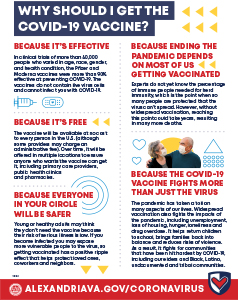
COVID-19: Why Should I Get the Vaccine?
WHY SHOULD I GET THE COVID-19 VACCINE?

Because it's Effective
In clinical trials of more than 40,000 people who varied in age, race, gender, and health condition, the Pfizer and Moderna vaccines were more than 90% effective at preventing COVID-19. The vaccines do not contain live virus cells and cannot infect you with COVID-19.
Because it's Free
The vaccine will be available at no cost to every person in the U.S. (although some providers may charge an administrative fee). Over time, it will be offered in multiple locations to ensure anyone who wants the vaccine can get it, including primary care providers, public health clinics and pharmacies.
Because Everyone in Your Circle Will Be Safer
Young or healthy adults may think they don’t need the vaccine because their risk of serious illness is low. If you become infected you may expose more vulnerable people to the virus, so getting vaccinated has a positive ripple effect that helps protect loved ones, coworkers and neighbors.
Because Ending the Pandemic Depends on Most of Us Getting Vaccinated
Experts do not yet know the percentage of immune people needed for herd immunity, which is the point when so many people are protected that the virus can’t spread. However, without widespread vaccination, reaching this point could take years, resulting in many more deaths.
Because the COVID-19 Vaccine Fights More Than Just the Virus
The pandemic has taken a toll on many aspects of our lives. Widespread vaccination also fights the impacts of the pandemic, including unemployment, loss of housing, hunger, loneliness and drug overdose. It helps return children to school, brings families back into balance and reduces risks of violence. As a result, it fights for communities that have been hit hardest by COVID-19, including our elders and Black, Latino, undocumented and tribal communities.
How Do Vaccines Work?
Most vaccines -- including the current COVID-19 vaccine candidates -- work by triggering the body’s immune system to make antibodies that fight the virus without causing an active infection.
Essentially, vaccines teach the body to recognize the coronavirus and fight it. Most of the vaccines in Phase 3 clinical trials require two shots a few weeks apart; the first shot starts building protection and the second maximizes the protection. Building immunity can take several weeks, and individuals can still become infected with COVID-19 if they are exposed to it while in the process of receiving vaccines. Some individuals may experience temporary effects including fever and body aches which last a day or two and are the body’s normal response to developing immunity to a virus. It is not the COVID-19 infection. Vaccination will not lead to infection of COVID-19 and it will not cause a positive test result. Someone who has recovered from COVID-19 could potentially be reinfected, so they may also benefit from a vaccine. More studies will determine the duration of the vaccine’s effectiveness.
There are three types of COVID-19 vaccines in the final stages of clinical trial, and they could soon be approved by the FDA for distribution. Each vaccine uses a slightly different approach to develop immunity to the COVID-19 virus, but they all involve harmless proteins that teach the body to fight the virus in the future.
-
Protein subunit vaccines contain harmless particles of the virus
-
mRNA vaccines contain material from the virus to enable cells to make harmless proteins that will stimulate the immune system
-
Vector vaccines contain a weakened version of a virus (different than the one that causes COVID-19) which has material from the virus that causes COVID-19 inserted into it and produces a harmless protein